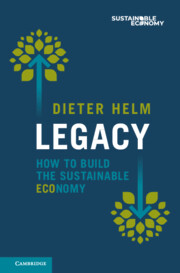Acknowledgements
All ideas are ultimately borrowed from someone else. I have the great good fortune to spend my career amongst many people much cleverer than me, and who have shaped and critiqued my arguments.
I started out under Amartya Sen’s supervision, and he got me to help John Hicks compile his collected papers whilst I was simultaneously working on my thesis. For me, Sen’s deep pluralistic and tolerant version of liberalism based upon justice, in turn grounded in capabilities, is the best way to think about what we owe to other people, and I have used some of his ideas to shape how I think about the legacy we should pass on to the next generation and its citizens. Understandably, despite lots of attempts to persuade him otherwise, he never really worked out the implications for the design of welfare states and the broader economy, and although the environment was important to him, he never wrote much directly on the issues, to the best of my knowledge.
John Hicks made the great years of high theory in the 1930s come alive and he helped me to see through much of what became the Keynesian enthusiasms. He once remarked to me that Keynes was so busy doing so many things that he never really had time to work out his ideas properly.
These are the two biggest influences on me from academic economics and I have borrowed the capabilities approach for my sustainable economy from Sen, and the Labour Standard to develop my Consumption Standard from Hicks.
Amongst my contemporaries, the two biggest influences on me have been Colin Mayer, who taught me to take accounts seriously, and Cameron Hepburn, whose constant comments and criticisms have been an inspiration to me.
During my time as chair of the Natural Capital Committee, Georgina Mace and Kathy Willis helped me appreciate the science of biodiversity. Ian Bateman is the stand-out environmental economist, and discussions with him helped shape my views on cost–benefit analysis. In rejecting much of the sort of economics Ian excels at, I learnt so much from him.
I am grateful for comments on and conversations about earlier drafts from Joe Grice, Tony Ballance, Chris Bolt, Stephen Glaister, Edward Barbier, David Vines, Laurence Lustgarten, Iain Smedley, Alex Teytelboym and Anthony O’Hear.
Academics shape debates, but our environmental problems will not be solved uniquely in ivory towers like Oxford. I have spent much time with civil servants across Whitehall and in Brussels, and with politicians. The latter include outstanding MPs, and a string of ministers and prime ministers. Though it is fashionable to criticise them, and indeed criticism is essential to democracy, I have learnt from them, not least because they have the art of appealing to voters – us. They, too, are the ones who will need to step up to the plate to avoid us going over the environmental cliff. Michael Gove was the reforming Secretary of State for the Environment, Food and Rural Affairs, challenging vested interests, and the architect of both the UK’s Agriculture and Environment Acts. Rory Stewart’s short time as Secretary of State for International Development offered a glimpse of what could have been done. I learnt a lot from both.
I am grateful to Chris Stark, the outstanding Chief Executive of the Climate Change Committee for his patient responses to my comments and challenges, Julia King, Mike Thompson, Glenys Stacey and James Bevan. Thanks, too, to Nick Barter, Julian Harlow and Rebecca McIlhiney.
Amongst the think-tanks and non-government organisations (NGOs), I am grateful for continuous engagements with Shaun Spiers and Richard Benwell.
None of course is responsible for any errors or omissions and none can be assumed to agree with all or any of my arguments, especially as this book is so much against the conventional intellectual and policy currents.
Cate Dominian has yet again beavered away at my scribbles and copyedited it all. Without her skills, support and good humour the book would never have seen the light of day. Jenny Vaughan has, as ever, been wonderfully helpful on the administrative side.
Thanks to Philip Good and Chris Harrison at Cambridge University Press for their enthusiastic and professional support.
Thanks finally to New College. The Warden and Fellows of New College, Oxford have continued to provide the best of all academic environments within which to write this book. It is the students and their contemporaries who will determine whether we – and New College – take the sustainable path.



